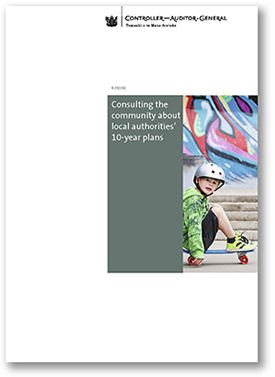Finding the balance between wants and needs
 “You can't always get what you want, but if you try sometimes, you just might find, you get what you need…”
“You can't always get what you want, but if you try sometimes, you just might find, you get what you need…”
By now, all new mayors, chairpersons, and councillors will be settling into your roles – and a key part of your role is to enable a good debate with communities about the future through the long-term planning process.
So how do you prepare for, and have conversations with your communities about, what they are prepared to pay for the services they expect to receive? And what do we expect to see in your 2018-48 infrastructure strategies? The next round of infrastructure strategies and consultation documents is an opportunity to build on the first iteration of these documents, learning from good examples and picking up on the points highlighted in two of our reports:
- Consulting the community about local authorities' 10-year plans
- Matters arising from the 2015-25 local authority long-term plans
We also think that SOLGM’s updated long-term planning guides are a useful resource.
Focus on long-term financial sustainability
Many of our previous reports highlight that we’re concerned that local authorities might be underinvesting in assets and so won’t be well placed to deliver the services that communities across New Zealand expect in the future. We’ve based our concerns on a trend of low levels of reinvestment in local authorities’ infrastructure. It looks like that infrastructure might be unable to meet the service expectations of communities in the future.
Infrastructure strategies provide the opportunity to discuss how to respond to communities’ changing demands and needs over time and what this means for the services you deliver to them. We’ve observed that the better infrastructure strategies have a clear, visionary narrative – they told the reader where the council was, where it wanted to be, and how the council was going to get there.
Painting a compelling story of the future under different scenarios can help you and your communities to focus on what needs to be delivered now, and how you address likely service requirements in the future – what would happen if you delayed the upgrading of a particular asset? How do you respond to more floods in the face of climate change? What does an ageing population mean for the services your community receives?
The basis for having these conversations about the future are your financial and infrastructure strategies – they’re the building blocks for your long-term plan and should tell an integrated story. The Local Government Act 2002 recognises this integration by allowing a local authority to adopt a single financial and infrastructure strategy document as part of its long-term plan.
My colleague Hugh Jory met with the Canterbury councils’ finance managers in February 2017. Hugh heard about the work these councils are doing collaboratively to improve their financial strategies. We commend this work and expect many of you are also taking this approach. We’re happy to discuss any insights we have gathered from others that could help you to prepare your next financial and infrastructure strategies.
Have the right debate – effectively engaging with your community
If you’re going to make lasting and affordable decisions with your communities’ input, then you need to provide information about the significant issues facing your communities, what choices they have to address the issues, and their implications on rates, debt, and levels of service.
Consultation documents need to present this information clearly and concisely based on the financial and infrastructure strategies in a form and manner that provides an effective basis for consultation – they must be easy to understand by interested or affected people.
In the next consultation documents, we’d like to see a better description of the significant issues, options, and implications as determined from your significance and engagement policies and in considering other matters that are important to your community.
You need to make sure that people are able to access information supporting the consultation document, and we’d like to see shorter documents! All of this takes time – we expect you to factor in enough for your council to do justice to this important document and process.
For inspiration, have a look at Timaru District Council’s consultation document that won the SOLGM Great CD competition in 2015.
Next blog
In our next blog, we’ll provide an overview of our sector report Local government: Results of the 2015/16 audits. As always, leave a comment below or get in touch if you have any questions, concerns, or suggestions.
